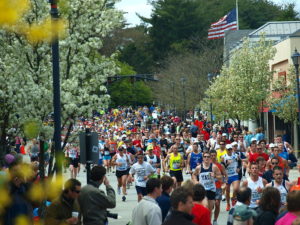By Ted McEnroe, The Community Roundtable
Monday is the 119th running of a remarkable tradition – the Boston Marathon. For decades, the Marathon has been a Greater Boston institution, a must do for people to either run, attend or watch on TV. People from across the region whose closest thing to a marathon over the past 12 months was running to the store drop whatever they are doing, brave the traffic and cheer on famous Kenyans and unknown Americans.
Over the course of the years, the Boston Marathon has used an annual running event to create a program that goes far beyond an athletic event. And it’s not the only one – The Kentucky Derby, The Indianapolis 500 and other iconic events raise up sports beyond their normal fan bases and engage people who wouldn’t otherwise watch runners, horses or Indy cars.
Wouldn’t it be great to capture some small essence of that in your community? Creating great community programs is one way to do it. And in some ways, it’s its own marathon.
So what lessons can you take from the Boston Marathon about creating community programs?
Regular scheduling matters: The difference between content and programming is simple. Content attracts members, while programs create opportunities for member engagement. Good programs become a part of a community calendar. Imagine if instead of on Patriots Day, the Marathon was run at a different time when the best runners in the world could make it. It would be great content, but it wouldn’t engage the community in the same way.
Tip: Doing community programs? Find times you can commit to, so your members know when to expect something to happen.
Create an opportunity to participate: A great piece of the Marathon is what happens long after the winners cross the finish line and collect their wreaths and prize money. Behind them, thousands of others – many of whom have never run a marathon before, stream up and down the same hills. They all have reasons to run, lessons to share and stories to tell. The marathon affords them the opportunity in a public space – although no one really wants to talk to you at Mile 21. It also gives them a new skill set – marathoner.
Tip: Some of the most powerful community programs are driven by members themselves – either as experts or idea generators. Give them that opportunity to learn, grow and develop new skills.
Capitalize on shared experience: A powerful piece of community programs and live events in a community goes beyond the content to the shared opportunity to experience that content. Whether that’s on the phone or web in a webinar, in person at a conference, the ability to engage in real time has an impact that is difficult to replicate asynchronously.
Tip: We like to make sure in our community programs that there is some real-time element – smaller programs are live calls where members can ask questions and stay connected. Larger programs and presentations have a backchannel chat that allows members to talk and connect during presentations, share resources and links.
Capture the value: Part of what makes the Marathon live on year to year is the stories that grow from it – positive and sometimes negative. It’s a thoroughly chronicled event (mostly by participants) and the past records can inspire new generations.
Tip: No matter how well you schedule, not everyone will be able to make your programs. Capturing notes or recording audio, and making them available after the fact both makes them part of the community’s research database and allows new members and those who couldn’t make the call a chance to gain from the experience (and see what they missed).
Have the patience to develop: Nothing about a marathon is easy. That one’s sort of obvious. But growing the Boston Marathon wasn’t that easy, either. The first Marathon had 18 runners and 15 finishers. It grew to 100 by 1906, but had fewer than 200 participants as late as 1960. By 1968, though, it hit 1,000, topped 2,000 in 1975, and nearly 8,000 in 1978. Today, the field is capped at over 30,000 and thousands of runners are turned away. Programs can feel slow to develop – they don’t really “go viral” like content. But for those with patience and determination, they can provide powerful engine for community.
Tip: Set realistic goals, and recognize that when starting programs, just as when starting communities, it can actually be beneficial to have smaller events that allow you to set expectations and provide better value for those who attend.
For any community, finding the right balance of content and programs is key to success. Content gets members to the community, but the programs you offer should be a key element of your strategy to keep them there.
The content and programs of TheCR Network provide members from more than 100 organizations with valuable insights and connections to start, build and grow their communities. Become a member today!

